Photographs: www.rajamahmudabad.com Archana Masih
This is what has happened to the Raja of Mahmoodabad.
After spending nearly half his life fighting a legal battle against the government, Mohammad Amir Mohammad Khan won back his ancestral properties that the government had confiscated under an Act -- which quite inappropriately in today's context is still called the 'Enemy Property Act.'
The Act, passed after the 1965 India-Pakistan War, pertains to the property of any Indian who had migrated to Pakistan after Independence, and placed it in the government's custody.
Even though Mohammad Khan is an Indian citizen who has served as an elected legislator -- though he is thoroughly disillusioned with politics now -- his fate is tied to the title 'enemy property' because his father took Pakistani citizenship in 1957.
Khan, known as the Raja of Mahmoodabad (near Lucknow), is the heir to his poet-politician father, a member of the Muslim League.
After Independence, tormented by the division of the country, his father left India for Karbala in Iraq, the most sacred place for Shia Muslims, and lived there for 10 years. He then went to Pakistan for a short time and later to London where he lived till his death in 1973.
"We all make existential choices. My father made his and I made mine. I knew starkly that the path would not be an easy one," says Mohammad Khan looking back at the struggle behind him, which is far from over.
His mother and he chose not to go to Pakistan, but the large property his father left behind mostly in Uttar Pradesh and present day Uttarakhand was seized by the government in 1965 due to the India-Pakistan war and could not be rightfully theirs till the 2005 judgment. The Supreme Court declared that a claimant could inherit the property provided s/he was an Indian citizen and natural legal heir.
Recounting those days when the fort was sealed by the government, the Raja in William Dalrymple's book At the Court of the Fish-eyed Goddess says that 'Everything was locked up. My mother who had never taken Pakistani citizenship lived in the verandah for three or four months before the government agreed to allow her to have a room to sleep in... She endured it all with great dignity. Until her death she carried on as if nothing had happened.'
Before the last session of Parliament the government brought in the Enemy Property Ordinance to nullify the 2005 Supreme Court judgment. The ordinance lapsed, but a new bill may be introduced in the Winter session incorporating the provisions of the July 2 ordinance, which primarily gives the government -- not the courts -- the final say in deciding the ownership of the property of those who migrated to Pakistan.
The Raja once again lost all that he had won back and his properties are yet to be restored to him.
"For years I have fought and I will not give up this fight. My forbearers fought with swords and I fight with the weapons of this age," he says, "At times I feel very tired but then there's always that inner voice that Gandhiji used to say -- you cannot allow yourself to go under."
Mohammad Khan has been shuttling between his home in Mahmoodabad fort and a rented apartment -- which he calls a camp -- in Delhi as he battles for his rights.
Married to Vijay, former foreign secretary Jagat Mehta's only daughter, he has two sons Ali and Amir.
"By putting it beyond the purview of the judiciary they are trying to put a lid on it so that no one can question it which in itself is unconstitutional. Enemy property has become an excuse to enrich builders, the land mafia and government servants," Ali said last week before leaving for Mahmoodabad to participate in a Shia religious observance that has been taking place in the fort there for generations.
Mahmoodabad was one of the richest estates of the Awadh province and the family had participated in the First War of Independence of 1857 for which it was later punished by the British when much of the Raja's property was confiscated.
Fluent in Arabic, Persian, Urdu, Hindi, English and French, Mohammad Khan represents an old world that tragically has almost perished.
In a conversation with Rediff.com's Archana Masih, interspersed with Persian verse, Ghalib's couplets and examples from the Bhagavad Gita, the Raja eloquently spoke about the demise of an old heritage, his dreams of its revival and his controversial patrimony.
Do you have to prove you are the legal heir all over again after it was already proven by the the Supreme Court in 2005? What is the status of your properties?
Yes, I have to prove it again. The court can only decide if the property is enemy property or not. Therefore, the judgment of the Supreme Court becomes null and void. It is scandalous, the courts have been superseded completely.
While the custodian was very quick in retaking control over the property even while the ordinance was being tabled in Parliament in August, today when it has lapsed I have no answer or response. They continue to hold the property illegally.
I have to endeavour to get them (the properties) back. I will seek the legal remedy available to me, but truly this is tantamount to harassment.
The underlying theme is the nexus between tenants, forgerers, custodians, government officials and the people who brought about this ordinance in Parliament.
Were you surprised by the ordinance?
I was surprised that after a clear and unequivocal judgment by the Bombay high court and then the Supreme Court, there could be no questions left about any matters pertaining to my property.
My belief in the institutions of this country -- no matter how battered they may be -- is intact and very complete.
I believe, we may be passing through a phase that all countries pass through -- of corruption, subversion of its best institutions like democracy.
But I have faith in this country, the institutions and the people.
You have fought half your life to win back your property.
Yes indeed I have, but I have never thought of it like that. For me it was a struggle which I felt was worth undertaking not for financial rewards because I knew the nature of the property that I would get back, most of which would be dead capital.
Notionally it might mean something but in actual, practical terms if you wanted to do something with it, you would have to fight another 10, 20, 30 years.
It was my patrimony, the efforts of my ancestors and forbearers and I believed that it would help me even though marginally realise my dream. That dream is very close to my heart and has assumed an urgency because its realisation is becoming increasingly difficult.
I had felt with this patrimony I could have laid the foundation of that dream.
'Culture is not only in monuments'
Image: The Bada Imambara built by Nawab Asaf-ud-Daulah in LucknowPhotographs: Uday Kuckian/Rediff.com
That dream is the preservation and continuation of a culture that has been grossly distorted by the colonial rulers. And in spite of that it continued because of its inner strength and vitality.
The economic base on which it was founded was being eroded, the human base was being affected and if there was no human base, who will carry the culture?
Culture in not only in monuments but much more so in language of that area which unfortunately became associated with the division of the country.
The sad part was that had it been accepted as that then one would have fought for it.
It appeared that it was accepted as one of the languages in the Indian Constitution, ostensibly things were done but a language can only survive and thrive if there is a need and necessity for it.
It cannot survive only for aesthetic purposes because it loses its reality, vitality, strength and ceases to evolve in the manner it should.
The patronage that came from a large group of people went and perhaps had to go because the economic system was changing but the change was so sudden, so violent and so destructive that the shock was felt all around the cultural expressions which this language -- Urdu -- had nourished.
Calligraphy is dying, Soazkhani is virtually dead, these need commitment or strong institutions to support it, they can't survive in an amateurish way or only with the government extending patronage.
Soazkhani was a form of chanting which brought together Muslim and Islamic themes with Hindu ragas and raginis woven beautifully. It was a part of Indian heritage. It was Islamic, but the manner in which it was presented was Indian, people hearing it knew that a certain soaz was being chanted in Jaijaiwanti, in Jhinjhoti, Bhageshwari, Bhopali, Bhairvai, Multani, Peelu.
Thirdly, the entire discourse has changed, we now have unwittingly, shockingly and sadly accepted the caricature which the colonialists made of us. There is this talk of nazakat -- which is a sort of gentility -- which makes me want to hold my head and weep.
These were the people who loved their land so much that they fought for ten months without a king against the British. Lucknow's streets were covered with blood. How could a people who believed in nazakat do this?
They were like any other people in the world but their culture was a highly developed culture because it was an amalgam of Turkic, Persian, Arabic and Hindu strands.
That multiplicity, that prism is lost.
Why did it die? It is almost non existent today.
Which Lucknow do you talk about? Lucknow as a town in history? Lucknow as a concept? Lucknow as an expression of a culture? Lucknow as a town of architecture -- which Lucknow?
The old Lucknow that is beset with problems, social and economic or the new Lucknow with its malls which could be anywhere.
The decline happened around the 1950s when the landed gentry went and it had to go because time were changing but metaphorically the violence and brutality with which it left, people found themselves without anything overnight. The compensation that they were paid was a pittance.
Had the government at that time thought that we would continue to liase with these people who we have dispossessed, supplement and support them if they continue to maintain those traditions, the institutions of culture, then it would have been a completely different matter.
The dream is that I lay the foundation and metaphorically plant an olive tree which takes a very long time to grow and in the Middle East it is believed that one who plants an olive tree is expressing great hope in God or providence.
'I am being indicted as someone who is not a part of India'
Image: An etching of the Mahmoodabad fortPhotographs: www.rajamahmudabad.com
My relationship with today's Lucknow is a physical relationship in the most elementary form. With every year that goes I find there are fewer and fewer people who have even a memory of that culture where I grew up.
Before I went to England I spent many crucial years here, my first school was in Karbala so the first languages I learnt was Persian and Arabic.
At 10, I came to Lucknow, went to school there for a few years and then went to England but Persian, Arabic and the Urdu of Lucknow were enough to kindle in me the fire and flame of passion and love for the city. Although even then it had declined.
You look at poetry, I am sure there are many good poets today but there are none who now have the stature that poets had before -- Asrarul Haq Majaz, Saqib Lakhnavi, Safi Lakhnavi (poets from Lucknow), Jigar Muradabadi.
The air that you breathed that helped you understand poetry. That culture pervaded everything and it is a great loss because had it remained, undoubtedly, it would have changed but it would have had its own inner dynamics. It has withered. It is stunted, it is growing in a different direction.
You lament the demise of the old order, but you love Lucknow.
True love never dies.
Change is a part of every culture.
Every culture changes -- France, China, England -- but there is continuity. Japan has managed to keep its culture and modernity, so there are examples, so have England and France.
I think of the terrible things that happened in 1857 was that people were slowly made to feel ashamed of their own culture, language and past. We cannot legislate about it and when we legislate and the guardians of law interpret it we stick out our tongues at them.
You see, I am acutely aware of my situation right now (about the government's ordinance).
Though a large number of Hindus spoke and wrote Urdu, somehow the colour was that of Muslims which was wrong.
One should not apologise for religion but the bane of secularism and in fact its great weakness is that it (secularism) has become a religion which says you should be ashamed of proclaiming your religion.
Yes, one should not proclaim it in an offensive but in a graceful and cultured way -- look at the wonderful masses in cathedrals -- Mozart's Requiem, Handel's Messiah -- the chanting of the Vedas, the bhajans of Meerabai, the singing of the Ramayana...
I participate in it not because of secularism but because it is a sacred song, that this is the sacral nature of language.
This did not need any teaching, prompting or tutoring, it became a part of the Hindus and Muslims of that period. That went away.
There was harmony, unity -- the blood that was shed on the streets of Lucknow in 1857 was of the Hindu and Muslim against what they saw as the oppressor.
The uprising of 1857 saw Hindus and Muslims fighting the British oppressors together.
Absolutely! In fact they had come together much earlier -- Shivaji's artillery was manned by Iranis.
People who stayed behind after Partition tied their fate happily and willingly with this country because they had a choice to go or not and they chose not to.
Today Mir Hasan's couplet comes to mind because of the kind of treatment that is meted out to them by insinuations and innuendos -- Turfa dar yeh hai ki apna bhi na jana, aur yu hi apna apna keh ke sabse begana kiya. (It is ironic that I who have committed myself to you, you did not fully accept me as your own, but you did it in a superficial fashion so I remain neither yours or anyone else's).
Is that what is going to produce the synergy, vitality, strength of this country?
Do you feel in some way akin to this abandonment?
I don't feel akin to this abandonment. I do feel that today I am being reminded that I am a Muslim not in the positive manner which would be the manner in which a pluralistic, tolerant society like India would have done but in a manner where I am being indicted as someone who is not a part of India.
I am told that the Muslims should come into the mainstream and I would like to ask what is the mainstream?
Every wave, wavelet, drop of the Ganga is the mainstream.
We are a part of the mainstream just like the Hindus, Sikhs, Christians, Parsis and our own expressions provide the beauty, diversity, adornment, plurality of this country which is a bouquet of jewels.
As long as we remember that power inevitably has a destructive aspect to it and if we remember that we will not use religion or language as a means and vehicle for negative purpose.
There are quawwalis that begin with Krishanji and end with the Prophet without emphasing they are one. What is it being replaced by? Has it been replaced by something that is richer more beautiful more plural? No, it is being replaced by the most superficial aspects of Western culture.
That space where it existed is empty now or is just filled with a sort of detritus of the old culture and today the new superficial Western culture takes its place.
'UP's Muslim Raja is almost a circus clown while Rajasthan's Hindu Raja represents heritage'
Image: Mohammad Khan, the Raja of MahmoodabadPhotographs: Archana Masih/Rediff.com
I have to endeavour to get it back.
In these five years I have found it extremely difficult to provide and organise the economic wherewithal to begin to build -- not a hotel but a kind of heritage place where heritage can at least be glimpsed.
For that you have to have been that heritage. I don't want a hotel in Butler Palace (in Lucknow) or Mahmoodabad, there are so many creative solutions and possibilities instead. A place where musicians could be provided a stipend to practice and develop the art to produce excellence, similarly with calligraphy, textiles, perfumes etc.
The plan that I have for the quila of Mahmoodabad is that it should be a retreat for artists and I would continue living there.
There are still some people in Lucknow who against odds are trying to maintain it and this is a place that would be ideal for them and if I succeed god willing (says in Persian and translates) If God is your helper then no one can overcome you.
In Rajasthan and Madhya Pradesh royals have been able to preserve their property because they have converted in into hotels and since this template has become a sort of example, you think it is easier to build hotels than a centre for art?
It should not be difficult but you've spoken of a place whose history and social composition are different from that of UP. The conflicts in Rajasthan were of a different kind, Rajasthan was never associated with Pakistan.
I am sorry for putting it so starkly, but UP was.
UP had two very strong rich strands -- Hindu and Muslims. Unfortunately because of Partition, a conflict exists whether you like it or not, so the conciousness of the Hindu-Muslim divide although it is more civilised than many other parts of the country -- is very much a part of it.
Therefore in the context of UP, a Muslim Raja almost becomes like a circus clown whereas a Hindu Raja of Rajasthan is representative of a heritage. Isn't it ironic?
Do you feel the space is getting smaller and smaller for people like you?
Let me translate a poem in Persian. It is called 'I am a root in this land'.
The poet addresses it to a person who has left Iran to migrate to America and says:
'I understand the reason why you left because of the howling of the wolves and the incessant crowing of the crows.
Because there was a darkness when your friends betrayed you, those who promised to lead you to your destination, led you in another direction and I know all this but I am not going to follow you. You are going today and my tears of farewell bless you. Because you have been forced to leave but I am root in this land, if I am plucked it is as if the heart is being plucked from the body. I love this land whether I am pure of impure, why do I love it I do not know and I shall be here till my last breath. I shall rise from the dust and from the depths of the earth my hand which is empty now will gather petals and shower them when the sun arises from behind the mountains. Because I know that you will return to this land.'Sadly, Gandhiji's only daily remembrance is the picture on the rupee note'
Image: Mahatma Gandhi's statute in New York CityPhotographs: Vaihayasi Pande Daniel/Rediff.com
My father was a very tortured and tormented soul. I was so privileged to be his son. He was a very fine man. A poet rather than a politician.
He was 40 something when Partition took place and was the youngest member of Jinnah's working committee.
In 1947 he was shocked to see what had happened and went into self-imposed exile to Iraq as an Indian and took all of us there.
We built a house in Karbala. It had two fountains -- one inside and one outside. There was a library with books and manuscripts.
He lived in Karbala and Baghdad for 10 years till '57. He lived there for two reasons because Karbala is city of the prince of martyrs and being in the vicinity of such a place, my father must have felt a certain solace that he was in the shadow of a shrine and this would be an expiation, a purging of the soul for sins he had never imagined could be committed as a result of Partition.
He was a very good man and had he not been that I would not have won the election with an unprecedented majority.
A majority of the people of Mahmoodabad are Hindu. They remembered the man and not the man connected in the creation of Pakistan.
When he was in Karbala perhaps he wanted his wounds to heal. He had a very ascetic life and great admiration for Gandhiji.
He went from there to Pakistan in '57, I came to India with my mother in '53-'54. We stayed here until I went to study in England. I saw him on and off.
I never stayed much in London except for the year I stayed with him in Regent's Lodge which was a house belonging to the prince regent which was given by the king of England to King Farouk (of Egypt) in return for land that King Farouk had given for a cathedral in Alexandria.
The king had given this so that it could be a centre where Muslims could meet, so it was called the Islamic Centre and my father was the director general and the only Shiite to head it.
There is a beautiful mosque there called the Regent's Park mosque. I sometimes feel that maybe things would be different but I also feel that perhaps it was God's will that it would be so and who are we to question his will.
There are things in life that cannot be understood by Aristotlean logic -- where the law of the excluded middle holds -- either or -- either this is right or that is right. There are statements about which you can say nothing and the famous narrative of the Upanishads comes to mind where a disciple was asked to take the layer of the seed one by one and he takes the flower first and then the seed and nothing is left and the end is neti neti neti.
What do you think is going to happen about the fate of your property?
I don't know. It is in the nature of politics to look at the ends and not the means while Mahatma Gandhi always said that it's equally important to look at the means but then he is out of fashion.
I am sorry to say his only relevance is confined to a few individuals and his only remembrance daily is the picture that appears on currency notes.
Do you think you will be able to get full possession?
You put your trust and belief in your god. You do what you have to do and do not ask. In the Gita it says the same thing when Arjun asks Krishna. You do your karma.
So this is an ongoing fight?
Yes. How will depend on the context and situation of how it happens, not just this struggle, but the struggle that will follow and at least give some concrete form to the dream I have.
There are six trusts, they are all affected by this law unfairly, wrongly. A trust (wakf) dedicates the property to God and gives it to Him, you cannot alienate, you cannot sell it. A large part of its fruit has to go to the poor.
God cannot be an enemy.
I will make my effort within the parameters of law.
'India is great because of its indestructible treasure of wisdom and civilisation'
Image: The Red Fort in DelhiPhotographs: P Mathur/ Reuters
It is dead capital. It is very difficult to transform this into productive cash. I am not the only person. There are so many people who own so much.
Does anyone go and find out the cost of this corporate house, his property? Is it because I am called Mohammad Khan, is that reason?
Vested interests for their own ends not because of nationalism but other ulterior motives want to keep alive words like 'enemy', 'Muslim', 'Pakistan' and somehow in a very subtle way put all these three in the minds of an audience.
Do you feel because of this 'enemy' property label you have to prove your Indian-ness time and again?
Not at all! Let them prove otherwise, let the burden of proof be on them. I have nothing to prove.
I know I am Indian and I wish not to even speak about it. It is like asking someone are you a human being or not?
Your mother spent three months on the verandah of your home after it was sealed. She must have been a very resolute woman?
Yes, because of Moharram. Her commitment was such, she couldn't leave because religious observances had to take place and she did what she did every year, she lived there with great grace and dignity.
She was the rani of Bilhera because she had no brothers and was the eldest daughter. She succeeded her father when she was a minor of 10 years old. She and her two sisters were taken in the care of the district magistrate.
My grandfather -- my father's father -- then got custody of her and then she lived with her mother in her own home and later my father married her while my real uncle married her sister.
She knew what it was to lose, her brother died and within a few months her father died and in a few months her mother died -- from the day her father died, her mother never lay down. She sat in a sort of vigil till her death.
What do you find the biggest change in the India of today?
Aggression. A desire to prove that has already been proven in myriad different ways that India is great. It is something that the whole world knows.
India is not great because of its military might, or growth rate. India is great because it has an indestructible treasure of wisdom, of thought, of tradition, of culture, of civilisation.
This great land has produced multitudes of thinkers, writers, poets, sants, sufis, mahants. Today you mention the name of Gandhi anywhere in the world to someone who has some education, he will know his name and if he's reasonably educated he'll know what he stood for.
Some of the railway stations in Iran have tiles with Gandhiji's sayings.
Economically how difficult is to maintain your quila?
Hellishly difficult. Not only Mahmoodabad but this whole struggle has been very difficult but again I will say that He is the sustainer and if I have faith in Him He shall not turn His gaze away from me.
Faith has kept us going and that has vindicated us over and over again.
But I feel very physically tired. I want to go away somewhere where there are the winds and the trees.

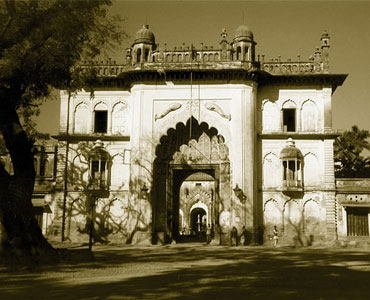
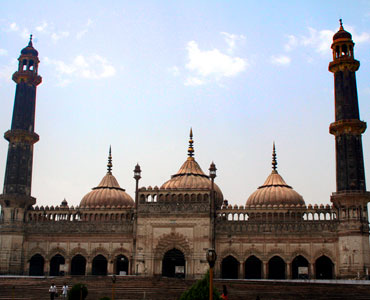
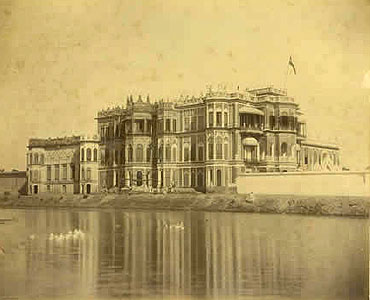
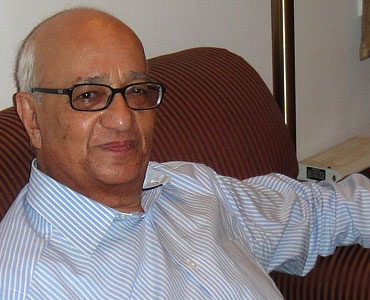
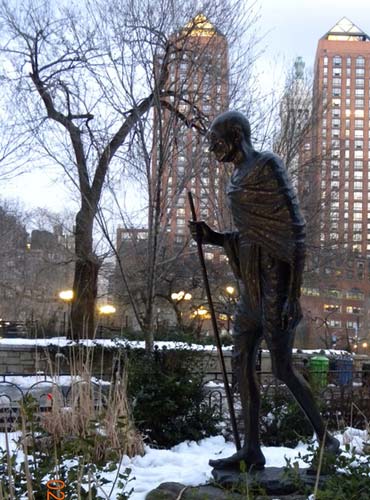
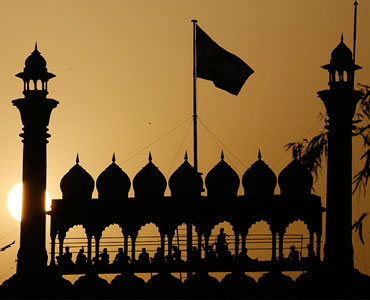
article